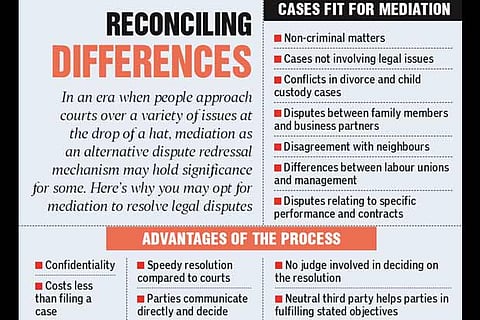

Chennai
The Tamil Nadu Mediation and Conciliation Centre (TNMCC), India’s first Court-Annexed Mediation Centre, was inaugurated on April 9, 2005. It was established as per mandate under Section 89 of the Civil Procedure Code, 1908, and functions under the Tamil Nadu Mediation Rules, 2010, framed by the Madras High Court.
After it was set up, as many as 54 cases were referred to it in 2005. But only 14 were settled. Though the number of cases being referred to it has steadily risen over the years, the settlement percentage has not been encouraging. Barring 2005 and 2007 when the settlement percentage was 25.93 and 24.47 per cent, it did not cross the 20 per cent mark in any of the other years.
In 2017, out of the 10,975 cases referred for mediation, just 1,331 cases were resolved, 6,545 ended in failure, 2,918 of the litigants were unwilling to go through mediation, while 3,835 cases were still pending. The settlement percentage worked out to only 12.13 per cent, while until March 2018, the proportion was an even lower 8.18 per cent.
In fact, during the past 14 years since mediation came into being in the state, out of the 63,123 cases referred for mediation, just 9,004 cases were settled, while 35,479 cases ended in failure. While 14,789 litigants were unwilling to settle their cases through mediation, 3,851 cases were pending with the overall settlement percentage working out to just 14.26 per cent.
P Murugan, director, TNMCC, while expressing optimism that the process is fast gaining momentum with awareness camps being held on a regular basis, said, “Mediation centres have been set up in all the 32 districts in the state. Besides the TNMCC centres at both the Madras High Court and Madurai bench, a district mediation centre has been set up at the City Civil Court, Labour Court Mediation Centre and Family Court Mediation Centre in Chennai.”
The essence of mediation is the resolution of disputes between parties with the help of well-trained neutral third-party mediators. The service provided by TNMCC comes to litigants without any additional cost. Moreover, the process is considered as a win-win situation for both parties since there is no adjudication about which party was right or wrong. Also, the whole process is voluntary and confidential. Another important feature is that if mediation fails, litigants can still proceed to contest the case before the court and whatever transpired during the mediation process will have no consequence or bearing on the court proceedings.
However, skepticism prevails over the process. Advocate A P Suryaprakasam says, “Besides people failing to have much knowledge about mediation and its effectiveness, they don’t like to sit across the person with whom they have a quarrel or misunderstanding to settle the matter. Moreover, at the end of it, the parties in dispute usually prefer to go to court to get appropriate orders in their favour.”
Notwithstanding this, the slow progress has also come to be blamed on the lack of understanding of the concept of mediation and other consensual dispute resolution (CDR) systems like conciliation and arbitration. The lack of teeth in the mediation process has also come up often, since, in contrast to the arbitrator or judge, the mediator has no power to impose any outcome on the disputing parties. This would naturally have no bearing on the ‘legal status’ and is bound to create a lack of trust among the parties during the process of mediation.
While many insist that a specific and clear law would certainly bring a revolution in the way litigants and legal practitioners approach consensual dispute resolution, it is also pointed out that lack of pre-litigation mediation also acts as a hurdle in the process since all mediations are court referred and there can be no private mediation.
But summing up the efficacy of mediation, Justice RV Raveendran, judge, Supreme Court, said, “All patients do not need surgery. Judgments of courts are like surgical treatments. Only cases which are not cured/ settled by medicines like mediation should go for surgery.”
While the legal community may raise issues, including the relationship of mediation to the judicial system, accredited mediators underscore that mediation is intended to complement and not replace the judicial process, and the expertise in India is already growing rapidly.
Visit news.dtnext.in to explore our interactive epaper!
Download the DT Next app for more exciting features!
Click here for iOS
Click here for Android